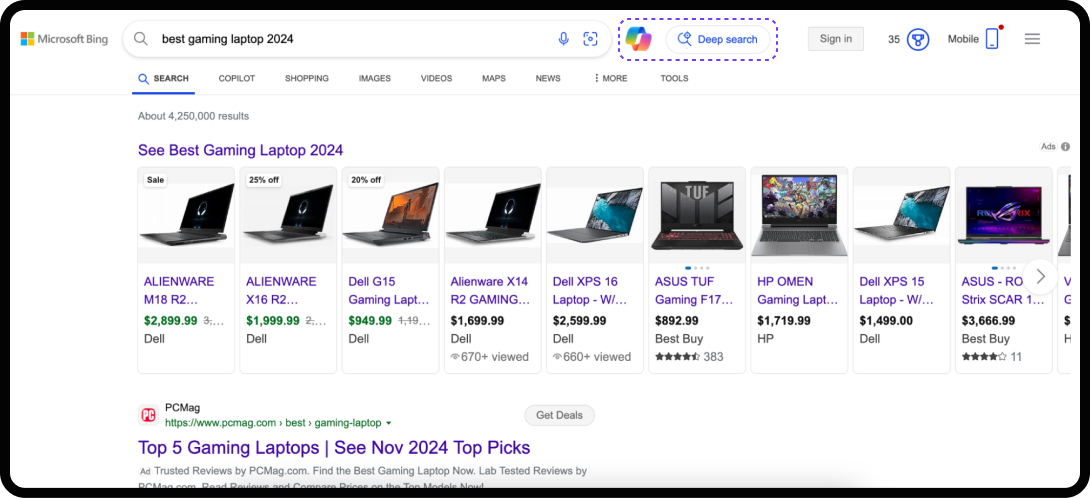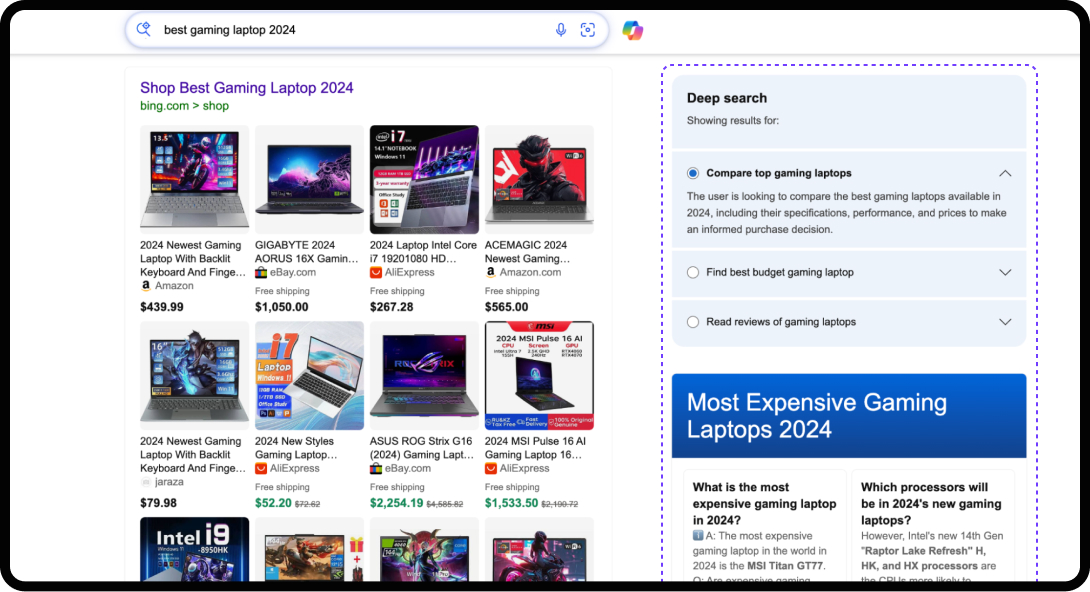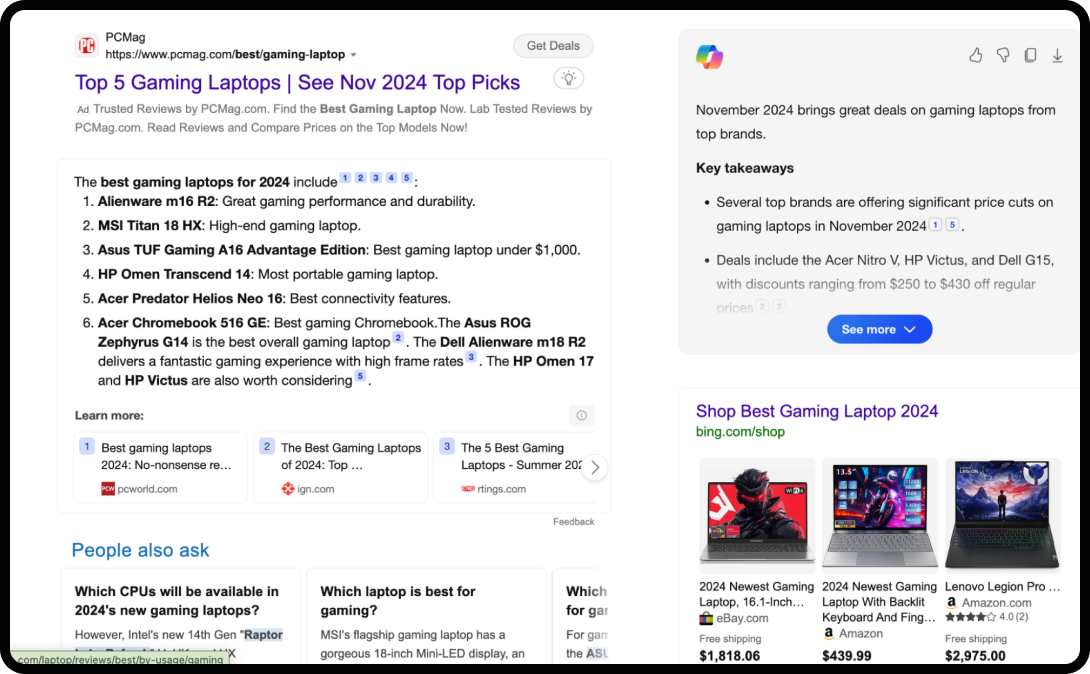Bing, developed by Microsoft, is the second-largest search engine globally, commanding a significant share of the search market. While it may not match Google in terms of overall traffic, Bing powers approximately 10% of all searches, which translates to millions of potential users. Its integration with Microsoft products like Windows and Office further expands its reach, making it a vital platform for digital marketing.
The importance of Bing SEO in digital marketing cannot be overstated. With less competition than Google, businesses can find valuable opportunities to rank higher in search results. Bing’s user base tends to be older and more affluent, offering marketers access to a demographic that is often ready to engage and convert. By optimizing for Bing, businesses can tap into this unique audience and enhance their visibility.
In recent years, Bing has seen an increase in users following various scandals involving Google. Specifically, after Microsoft introduced its AI-powered version of Bing in February 2023, page visits to Bing rose by 15.8%, while Google experienced a nearly 1% decline in the same period. This growth can be attributed to the enhanced features and capabilities that the integration of AI brought to Bing, making it more competitive in the search market.
Bing vs Google SEO: Key Differences

Bing has AI summaries like Google does, but it actually has more built-in AI features available to users. Copilot and DeepSearch can be accessed in one click directly from Bing’s homepage.
Copilot is an AI assistant that provides in-depth summaries of search queries, similar to other models like ChatGPT, Claude, Perplexity and Gemini.
Deep search provides users with an entire page of rich results and user experience features like product snippets, YouTube videos, AI summaries, comparisons, and more.

Bing places a strong emphasis on exact-match keywords. Unlike Google, which uses semantic search to understand user intent and variations of keywords, Bing favors pages that contain the exact terms users input. This means that keyword density and placement are necessary for ranking well on Bing. Additionally, Bing tends to reward older domains more than Google, which focuses heavily on content quality and relevance regardless of domain age.
Unlike Google, Bing tends to crawl websites less frequently and focuses primarily on key pages, which means that updates to less prominent pages may take longer to reflect in search results.
While both search engines prioritize fresh, high-quality content, Bing places a slightly greater emphasis on up-to-date content as a ranking factor.
Bing also incorporates user engagement metrics into its ranking algorithm:
- Click-through rates (CTR): This metric indicates how often users click on a link after seeing it in search results. A higher CTR signals to Bing that the content is relevant and engaging, potentially boosting its rank.
- Time on page and bounce rates: These metrics reflect how long users stay on a page and whether they leave without interacting further. A longer time spent on a page generally suggests that the content is valuable, while a high bounce rate can indicate that users are not finding what they expected.
Keyword Research for Bing
Exact Match Keywords > Semantic Keywords
Bing places a stronger emphasis on exact-match keywords than Google. While Google’s algorithm is designed to understand context and synonyms, Bing favors pages that use the exact search terms users input. This means that keyword density and precise placement in content are more critical for ranking well on Bing.
Bing prioritizes content that is not only relevant but also authoritative and trustworthy. Therefore, creating high-quality content around targeted keywords can significantly enhance rankings. Long-tail keywords are typically less competitive and more specific, making them easier to rank for on Bing. These keywords reflect user intent better and can lead to higher conversion rates.
Don’t hesitate to try different keyword combinations and variations. Tools like the Bing Keyword Tool can help generate a wide range of suggestions based on slight changes to your seed keywords.
Targeting User Queries on Bing

After searching on Bing, scroll down to the “Related searches” section at the bottom of the results page. This section provides additional keyword ideas that users commonly search for in relation to your original query. Bing users often search using question-based queries. Incorporating these types of keywords into your research can help you create content that directly answers common user questions, improving your chances of ranking higher in search results.
Bing’s audience tends to be slightly older and more affluent than Google users. This demographic difference influences the keywords that may perform well on Bing. Marketers should consider this when selecting keywords, focusing on terms that resonate with a more mature audience and their specific interests and needs.
Bing On-Page SEO Techniques
Meta Data Information
Bing places significant importance on title tags and meta descriptions. Ensure that your title tags are descriptive and relevant and include your target keywords. Unlike Google, Bing may choose to display its own version of the title if it deems it more relevant. Similarly, write engaging meta descriptions that incorporate keywords and encourage clicks, as they can influence your click-through rates (CTR) significantly.
High-Quality Content on Bing
Bing prioritizes high-quality, engaging content that addresses user queries comprehensively. Focus on creating informative content that meets user needs while incorporating exact-match keywords naturally throughout the text.
The three pillars of quality content for Bing are:
- Authority: Establish credibility by citing reputable sources and integrating social media signals.
- Utility: Ensure your content sufficiently meets user needs.
- Presentation: Make information easy to read with clear formatting and logical flow
Bing also has some On-Page factors that align with Google’s such as internal linking, optimized images, mobile-friendly content, and URL structure. Bing excels in indexing multimedia content, including images and videos, so including videos and infographics in your content can improve your organic visibility in search results.
Bing Off-Page SEO Strategies
Social Media Engagement
Brands can blend their off-page SEO strategy with organic social to improve rankings. Bing explicitly acknowledges social media engagement as a ranking factor, unlike Google, which has stated that social signals do not directly influence its rankings. This means that the likes, shares, and comments your content receives on platforms like TikTok, Instagram, and Facebook can improve your visibility on Bing. The more engagement your content garners, the better it can rank in Bing’s search results.
To further improve engagement, brands can partner with influencers and collaborate with other brands to boost engagement and organic visibility in Bing search results.
Backlinks
Acquiring high-quality backlinks is crucial for improving your rankings on Bing. Focus on obtaining links from reputable websites within your industry. Bing values the quality of backlinks over quantity, so it’s important to prioritize links from established websites with high domain ratings.
Here are some strategies to acquire high-quality backlinks:
- Guest Posting: Write articles for reputable blogs or websites in your niche that allow you to include a link back to your site.
- Link Exchanges: Identify link exchange opportunities on high DR websites and reach out to their team for a link exchange
- Create Shareable Content: Develop engaging and informative content that others will want to link to, such as infographics or comprehensive guides.
Local SEO on Bing
If you have a local business, optimizing for local search is essential on Bing. Your Bing Places profile will help users find information about your business.
Here are two ways to optimize local presence on Bing:
- Bing Places for Business: Claim and optimize your business listing on Bing Places. Ensure all information, including address, phone number, and business hours, is accurate and up-to-date.
- Local Keywords: Incorporate local keywords into your content and meta tags to attract nearby customers.
Forums and Discussions
Participating in online forums is not a direct ranking factor on Bing, but it helps build authority, generate backlinks, increase traffic, enhance user engagement metrics, and potentially boost social signals—all of which are important factors for improving visibility on Bing’s search engine results pages (SERPs).
By actively participating in forums and discussion boards like Reddit and Quora, you can position yourself as an authority in your niche. Sharing valuable insights and expertise helps build trust with users, which can lead to increased traffic to your website. Bing values high-quality content and user engagement, so establishing authority can enhance your site’s credibility.
Forums provide opportunities to link back to your site. When you answer questions or contribute to discussions, you can include links to relevant content on your website. Quality backlinks are a significant ranking factor for Bing, and links from reputable forums can improve your site’s authority and visibility in search results.
Technical SEO for Bing
Site Architecture
Creating a logical hierarchy for your content helps Bing navigate your site more seamlessly. Organize your main navigation menu with clear categories and subcategories that reflect the content on your site. It’s also important to Implement breadcrumb navigation to help users understand their site location and improve internal linking.
All of the pages on your site should be no more than two or three clicks away from the home page. If pages are buried too deep in your site, it will be difficult for Bing’s crawler to find and index them.
After you have optimized your site architecture, submit a new an XML sitemap and robots.txt file to Bing to tell crawlers which pages are important on your site.
Structured Data
Since Bing’s Deep search provides users with an entire page of rich results for their query, structured data is a must-have for snagging a spot in these results. Bing’s extensive, rich results make it popular amongst online shoppers.
Businesses should implement schema markup on all product pages, FAQs, videos, reviews, events, and articles. Add your schema markup with JSON-LD format to Schema.org, then validate using Bing Markup Validator to ensure your structured data is correctly implemented and free from errors.
Monitor Crawl Errors
Regularly monitor crawl errors using Bing Webmaster Tools to identify issues that may hinder indexing.
- Fix Broken Links: Address any broken links or 404 errors promptly to improve user experience and ensure all content is accessible.
- Redirects: Use 301 redirects for moved content to preserve link equity and guide users seamlessly to the new location.
HTTPS Certificate
Bing prioritizes secure websites in its rankings, so implementing HTTPS is essential. Make sure you have an SSL Certificate installed, which encrypts data between the server and users, enhancing security and trustworthiness.
Bing Webmaster Tools
Bing Webmaster Tools help site owners optimize their sites more effectively for better rankings in Bing search results. All you have to do is create an account and then submit your website and site map.
Site Verification
Users can verify ownership of their websites through various methods, such as adding a meta tag to their HTML or uploading an XML file. Verification is essential for accessing detailed site performance data.
SEO Site Analyzer
This tool provides insights into your website’s performance, including keyword rankings, backlink analysis, and overall site health. It helps identify areas for improvement to enhance visibility on Bing.
Keyword Research Tools
Bing Webmaster Tools offers keyword research capabilities that help users discover relevant keywords, analyze search volumes, and understand competition.
Performance Reports
The platform provides detailed reports on search performance, including impressions, clicks, and average position for keywords. This data helps users track the effectiveness of their SEO efforts over time.
Backlink Profile
Users can view which sites are linking to theirs, allowing them to assess their backlink profile and identify potential link-building opportunities or disavow harmful links.
Crawl Control
This feature allows users to manage how often Bing crawls their site and the number of pages crawled per day, which can be useful for optimizing server load.
Bing Has a Stake in the Future of Search
With the ongoing development of AI capabilities and integration tools like Copilot and Deep Search, Bing is positioned to attract more users. The rise in daily active users indicates that Microsoft’s efforts are paying off, and there is potential for further growth as more people become aware of these features.
Recent developments, such as the EU’s Digital Markets Act (DMA), could provide Bing with a more level playing field against Google. Microsoft has been vocal about regulatory issues that favor Google, and any changes in these policies may offer opportunities for Bing to capture additional market share.
A significant hurdle for Bing is changing user habits. Google has become synonymous with search itself, making it difficult for users to switch to Bing despite improvements. The challenge lies not only in technology but also in overcoming established brand loyalty.




